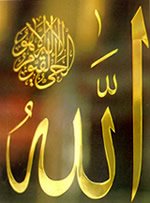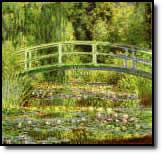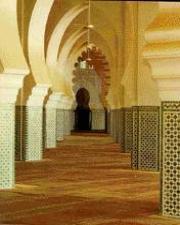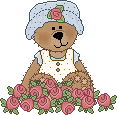Islamic Flowers
Tuesday, February 08, 2011
Sunday, February 12, 2006
Liberation by the Veil.
Here is an article that shows the beauty and lovliness of full hijjab... I hope that it benefits all those who read it, and I hope that it uncovers the supposed mystery, of why women would choose to wear it... and it is also a call to all those sisters out there who are trying to do the right thing, and cover modestly, may Allah strengthen your Imaan and make your path easy...
Liberation by the Veil.
Modesty and chastity, very important ideologies with Islam, are achieved by prescribing standards on behaviour and the dress of a Muslim. A woman who adheres to the tenements of Islam is required to follow the dress code called Hijab; other synonyms are Veil, Purdah, or just Covering. It is an act of faith and establishes a Muslim's life with honor, respect and dignity. The Hijab is viewed as a liberation for women, in that the covering brings about "an aura of respect" (Takim, 22) and women are recognized as individuals who are admired for their mind and personality, "not for their beauty or lack of it" ( Mustafa ) and not as sex objects.
Contrary to popular belief, the covering of the Muslim woman is not oppression, but liberation from the shackles of male scrutiny and the standards of attractiveness. In Islam, a woman is free to be who she is inside, and immured from being portrayed as sex symbol and lusted after. Islam exalts the status of a woman by commanding that she "enjoys equal rights to those of man in everything, she stands on an equal footing with man " (Nadvi, 11) and both share mutual rights and obligations in all aspects of life.
Men and women though equal are not identical, and each compliments the other in the different roles and functions that they are responsible to. " From an Islamic perspective, to view a woman as a sex symbol is to denigrate her. Islam believes that a woman is to be judged by her [virtuous] character and actions rather than by her looks or physical features" (Takim, 22). In the article, "My Body Is My Own Business", Ms. Naheed Mustafa , a young Canadian born and raised, university-educated Muslim woman writes, "The Q’ran [ which is the Holy Book for Muslims] teaches us that men and women are equal, that individuals should not be judged according to gender, beauty, wealth or privilege. The only thing that makes one person better than another is his or her character." She goes on to say, "In the Western world, the hijab has come to symbolize either forced silence or radical, unconscionable militancy. Actually, it’s neither. It is simply a woman's assertion that judgement of her physical person is to play no role whatsoever in social interaction."
Muslims believe that God gave beauty to all women, but that her beauty is not be seen by the world, as if the women are meat on the shelf to be picked and looked over. When she covers herself she puts herself on a higher level and men will look at her with respect and she is noticed for her intellect , faith ,and personality, not for her beauty. In many societies, especially in the West, women are taught from early childhood that their worth is proportional to their attractiveness and are compelled to follow the male standards of beauty and abstract notions of what is attractive, half realizing that such pursuit is futile and often humiliating (Mustafa). Chastity , modesty, and piety are promoted by the institution of veiling. The hijab in no way does not prevent a woman from playing her role as an important individual in a society nor does it make her inferior." (Takim,22)
A Muslim woman may wear whatever she pleases in the presence of her husband and family or among women friends. But when she goes out or when men other than her husband or close family are present she is expected to wear a dress which will cover [her hair and] all parts of her body , and not reveal her figure. What a contrast with Western fashions which every year concentrate quite intentionally on exposing yet another erogenous zone to the public gaze! The intention of Western dress is to reveal the figure, while the intention of Muslim dress is to conceal [and cover] it, at least in public (Lemu,25).
The Muslim woman does not feel the pressures to be beautiful or attractive, which is so apparent in the Western and Eastern cultures. She does not have to live up to expectations of what is desirable and what is not. Superficial beauty is not the Muslim woman's concern, her main goal is inner spiritual beauty. She does not have to use her body and charms to get recognition or acceptance in society. It is very different from the cruel methods that other societies subject women, in that their worth is always judged by their physical appearance. There are numerous examples of discrimination at the workplace where women are either accepted or rejected, because of their attractiveness and sex appeal.
Another benefit of adorning the veil is that it is a protection for women. Muslims believe that when women display their beauty to everybody, they degrade themselves by becoming objects of sexual desire and become vulnerable to men, who look at them as " gratification for the sexual urge"(Nadvi,8). The Hijab makes them out as women belonging to the class of modest chaste women, so that transgressors and sensual men may recognize them as such and dare not tease them out of mischief" (Nadvi, 20). Hijab solves the problem of sexual harassment and unwanted sexual advances, which is so demeaning for women, when men get mixed signals and believe that women want their advances by the way they reveal their bodies.
The western ideology of, 'if you have it, you should flash it!' is quite opposite to the Islamic principle, where the purpose is not to bring attention to ones self, but to be modest. Women in so many societies are just treated as sex symbols and nothing more than just a body who "display themselves to get attention" (Mustafa). A good example is in advertising, where a woman's body is used to sell products. Women are constantly degraded, and subjected to reveal more and more of themselves. .
The Covering sanctifies her and forces society to hold her in high esteem. Far from humiliating the woman, Hijab actually grants the woman an aura of respect, and bestows upon her a separate and unique identity (Takim, 2). According to the Qu'ran, the same high standards of moral conduct are for men as it is for women. Modesty is essential in a man's life, as well, whether it be in action, morals or speech. Islam also commands proper behaviour and dress of men, in that they are not allowed to make a wanton show of their bodies to attract attention to themselves, and they too must dress modestly. They have a special commandment to lower their eyes, and not to brazenly stare at women.
In Sura Nur of the Holy Qu'ran it says, " Say to the believing men that they should lower their gaze and guard their modesty; that will make for greater purity for them, and God is well acquainted with what they do". Many of the misconceptions of the Muslim woman in the west, particularly her veil stems from Arab and Muslim countries that have deviated from the true doctrines of Islam, and have " mixed up Islamic principles with pre-Islamic pagan traditions" (Bahnassawi, 67)
In this present period of decline from Islam, many Muslim women are alienated , isolated from social life, and are oppressed by Muslim men and rulers who use the name of religion for their injustices. (Bahnassawi, 65) In this instance, the Hijab is used as a means of keeping many Muslim women away from society, with the misconception that it signifies isolation and weakness. But as many Muslim women come back into the fold of the untainted and true Islam, they are able to recognize the injustice of men who have for so long stripped them of their rights to be an integral part of society and "deserving the same dignity, honor, progress and prosperity as the men" (Nadvi,26). Women regaining their true identity and role in society, are now wearing Hijab and embracing its concept of liberation for women, and are taking their rightful places that Islam had endowed upon them fourteen hundred years ago.
Please copy and distribute to whoever can benefit from the above paper. Thank you, peace and blessings of Allah to all my brothers and sisters in Islam,
Sehmina Jaffer Chopra
Sunday, November 13, 2005
Part 1:- My Journey to Islam.

I reverted to Islam 21 months ago, that's nearly 2 years now, and it has been a total life changing experience. So for someone entering the autumn years, it's an interesting place to be. Having had to cope with feeling out of place all my life, it's nothing new, in any case. I guess the problem was, I was a thinking child. I can't remember how deep, I don't think children gauge that sort of thing, I just thought and asked questions, driving mum crazy. Always religious and weird, other kids always avoided me. Hounded in the playground, I learned to keep myself to myself and lived in a world of my own. My parents thought I adjusted well to moving about as we did, from Perth, to Adelaide, to Sydney -Fairfield, Toowoomba QLD, back to Adelaide, Maryborough QLD, etc, etc.....There were 5 of us children, but we coped in ways that is hidden from us, and only Allah knows. So religion (Roman Catholic) and reading were my life and sanity savers. I could not conceive of a God that was divided into 3 persons, AT ALL. It was stupid and illogical so was worshipping Mary as the Mother of god!!! As for worshipping the saints??? All left a bad taste in my mouth though I did admire them as examples for humanity, that is until I learned they were not as they seemed. Moving on in life and various states of mind, wading through religious idealogies, I formed a solid and developing base for my belief system. 1. ....One God. 2. ....Heaven and Hell. 3. ....Charity in thought and deed (a) do well to others (b) compassion 4. ....Prayer.
The New Church (General Church of the New Jerusalem) was the Church I joined when I turned 18, and where I met my first husband. The writings of Emanuel Swedenborg, was the basis of my philosophy for my life and helped me considerably to understand the deeper meaning for my questing mind. I married when I was 25 and basically naive. I still knew it would be no bed of roses, but did not realise it would be so heartrendingly, sad. I did have moments of happiness, but they got very few and far between. But I would still do it all again, if I had to, for my children. I was the little things in life that kept me going, like a cup of tea or the sun shining on the leaves of a tree, reminding me of the Lord. I became intolerant of people who hurt others, especially children; people who were rude and peopeople who filled their minds with the trivial things of life.... But most of all, INJUSTICE.... Injustice left me with a burning deep inside me, and it made me want to change things somehow. I didn't know how, but just that I wanted to. Then 10 years after my divorce to my first husband, I married my present husband who is the antithesis of my first. And who brought love and understanding into my life, which had by that time, become unbearable. I was alone, without my children, having lost them to the custody of my ex-husband after becoming ill. Rana, introduced me to Islam, by just explaining to me why sometimes he would wash his hands or some other little thing. So, without telling him anything about it, I explored Islam myself on the internet to read the Qur'an and other Islamic articles. The turning point for me was when I read what the Qur'an said about marriage and married couples. It was so beautiful, tears ran down my face. I was convinced....I told him the next day that I wanted to become Muslim..
Wednesday, November 09, 2005
From a Sad Place.

Strange title you think? Well, I think not. It hasn't been the best of weeks, when people don't want to seem to know you. I had some dental surgery done, consequently in a "down" at the moment. Everything is at a distance at the moment, I can't seem to connect to anyone.
Thursday, October 27, 2005

Young people start out life (say at 20), having some sort of plan or image in their mind, (some don't have any) of what they want or think their life will/could, be. They want to stay looking young and beautiful, strong with their "joi de vivre" pulsing through their bodies. I was one of them, to a point. I was young, (very young), un-materialistic and very hippie in my outlook. I was also extremely naive and a dreamer, religious and unconventional. God was always central to my life, without Him, I would have died, literally. When I was a teen, my father introduced me to different religions and cultures of the world, and I loved it. My family were Roman Catholic, with my father a well-travelled Irishman and my mother a RC convert, who was very religious. There were five of us children, with me as the eldest. We grew up travelling Australia, as my father was
a mining engineer and moving from job to job. Life was difficult, with many changes, different schooling systems and on top of that, different states had different systems as well.
